Best 4K projector 2024 - go big and bold with your display this year
Enjoy enormous 4K pictures this year with one of the best 4K projectors for movies, entertainment and gaming

1. The quick list
2. Best overall
3. Best budget
4. Best mid-range
5. Best luxury
6. Best for gaming
The best 4K projector matches the march of progress in visual fidelity: 4K is no longer a luxury for the discerning home cinephile. It has truly replaced HD as the standard for image quality and these lights will get you there instantly - wherever you find yourself watching or playing.
The advent of the PlayStation 5 and Xbox Series X in late 2020 was, as console launches tend to be, somewhat of a turning point in resolution, framerates, and visual clarity. Just as Playstation 3 helped BluRay become the standard, 4K devices have now reached even more homes and we really are in the era of 4K. And the best projectors for gaming are no exception.
So if you’re looking to take your home cinema system to the next level, or looking to replace your TV with a glorious and enormous picture from one of the best projectors, then these are a handful of your best bets, covering a range of options from all the established names and to suit a range of budgets. But remember, if you can’t stretch to 4K prices, there are still quality projectors among the best portable projectors, and the best projectors for PS5 and Xbox Series X to browse which might dial it down to HD to reduce the cost, for example.
The quick list
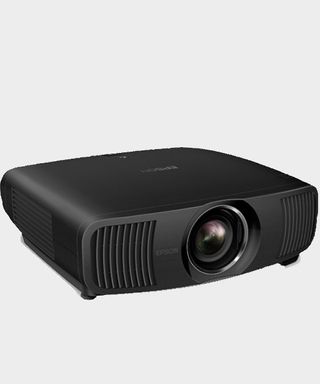
The best 4K projector overall
The Epson Pro Cinema LS12000 offers stunning 4K visuals, a 120Hz refresh rate, and excellent detailing to pack a fantastic UHD experience overall.
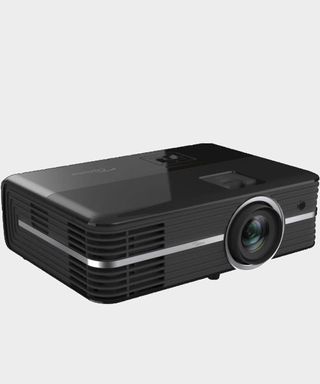
The best budget 4K projector
Optoma is less known brand but the UHD51 has been packing budget 4K picture into a more affordable price point for a few years now. This is a terrific runner, and won't break the bank.

The best mid-range 4K projector
With a slick design and nicely bright, vivid picture, the XGIMI Horizon Ultra is a 4K projector designed to fit the home cinema enthusiast's living room well.
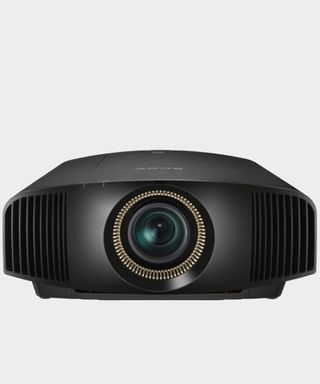
The best luxury 4K projector
It's a pricey one, but Sony's high end projectors rule the roost in the world of luxury 4K. The VPL-VW590ES brings super fast processing to the party for incredible upscaling.
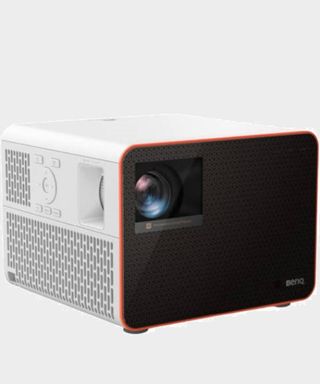
The best 4K projector for gaming
The BenQ X3000i is already one of our favorite projectors overall, but it's also the best 4K model for gaming as well. That's thanks to its excellent vivid colors and loud sound.
The best 4K projector overall



1. Epson Pro Cinema LS12000
Specifications
Reasons to buy
Reasons to avoid
Epson has plenty of the best 4K projectors in its roster, but the Pro Cinema LS12000 changed the game in 2022. This is a fantastic UHD device, prioritizing image quality over additional extras to provide a true home cinema experience.
✅ You're all about picture quality: The Pro Cinema LS12000 puts all its chips on picture quality, so if you do too you're going to be at home here.
✅ You're running new generation consoles: PS5 and Xbox Series X owners will be pleased to find HDMI 2.1 in here, with full 4K 120Hz compatibility.
✅ You've already got audio sorted: If you've already sorted your sound system (or you've got a headset handy), the lack of audio won't be too much of a problem.
❌ You'd rather spend more on an all-in-one solution: If you don't want to spend on an extra sound system or streaming device, it's worth moving further up the price scale for a 4K projector with all the extra features.
❌ You want something more portable: The LS12000 is relatively large projector which means it's not going to be moved any time soon.
Design: The Epson Pro Cinema LS12000 is a chunkier device than some 4K projectors on the market, but its smooth curves and simple black aesthetic means it can still blend into just about any setting. The standard throw means you've got plenty of flexibility in where your projector is located, and with all ports directed to the rear you can keep things tidy as well.
Features: The LS12000 prioritizes its video quality, which means you won't be paying for any additional extras here. That's a massive benefit for anyone looking for the last word in 4K picture quality, but it's well worth noting that there's no built in sound system or streaming apps in here. However, you are picking up a super snappy 4K 120Hz HDMI 2.1 connection, as well as HDR10, 10+, and HLG tech to keep all your games and movies singing.
Performance: There's a stunning picture quality to this lens. Not only are you getting super crisp UHD resolution with particularly impressive detailing across both light and dark scenes, but there's also a 2,700 lumens brightness which can handle a range of viewing environments. With plenty of customization options this is one for the true cinephiles or anyone looking to upgrade their gaming setup with a luxury investment.
Verdict: The Epson Pro Cinema LS12000 can keep up with pretty much any 4K movie or game you throw at it. It's not the cheapest model on the shelves, but if you're going all in on picture quality it's the best of the bunch.
The best budget 4K projector
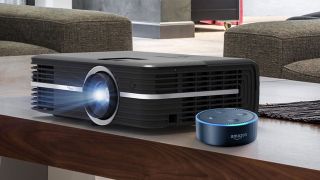
2. Optoma UHD51
Specifications
Reasons to buy
Reasons to avoid
You can sometimes end up paying for a brand when it comes to the best 4K projectors. However, if you stray from the traditional household names in home entertainment then you can find a real bargain, and Optoma is one of the brands that consistently deliver great value projectors which can go toe-to-toe with the big boys.
✅ You want to mount your projector
✅ You don't need extra apps and services onboard
✅ You want smart home functionality
❌ You want the best picture quality possible
❌ Keystone correction is a must
❌ You want a more subtle design
Design: Unlike the Samsung above, this cheaper Optoma model opts for a more traditional projector design. That means the black box carries a chunkier aesthetic, with grills running around the edges and a single silver strip cutting everything in half horizontally. There is a white model floating around for those after something a little more subtle, but it's more difficult to find at the moment. It makes up for this harsher design with a lightweight 5.2kg footprint, though, which makes it easy to mount.
Features: You would need to keep this hooked up to a video source to run video as it doesn’t have an onboard operating system that would allow you to stream direct, but that’s a small quibble when you’re getting such a great picture for the price. The 51 model also boasts Amazon Alexa compatibility and 3D picture, though we don't expect too many to be using the latter feature.
Performance: It offers fantastic colour, with good black depths, and smooths out fast motion to keep up with the quickest of action scenes. It also upscales non-4K images beautifully and even has 3D capability (which requires the purchase of DLP link active shutter glasses) should you want to re-watch Avatar ahead of the sequels. However, despite its good light rating, this unit may need the curtains drawn to get the most out of it as it struggles slightly with a lot of ambient light.
Verdict: The UHD51 has been out for a couple of years now, which means you can find some great deals on it, although 'budget' 4K still means four figures. Still, if you're not looking to go too crazy it's an excellent investment.
The best mid-range 4K projector




Specifications
Reasons to buy
Reasons to avoid
The XGIMI Horizon Ultra doesn't want to be the centrepiece of your living room, but when it's got its time to shine, you'll certainly be impressed with the image on offer. This isn't a native 4K projector, but it still outputs at a crisp, clean 3840 x 2160 and manages to do so while still packing powerful speakers and a versatile design.
✅ You want to mount to the ceiling
✅ You want Bluetooth audio options
✅ You want easy setup
❌ You need low latency picture
❌ You want native 4K
Design: The flat rectangular box doesn't look too much like a projector from the outset. For a start, there's no lens visible. However, once the kit is fully powered up, a small panel automatically slides down to reveal the main event for a particularly impressive boot sequence. The device itself is designed to slot into your living room easily, no matter your chosen aesthetic. Cream colored leather panels on each side, with their bronzy gold accents, make for a particularly luxurious look and feel.
Features: With the power of two dedicated light sources, the XGIMI Horizon Ultra offers up a nice wide color range and accurate picture. While a pixel shifter is doing most of the work to bring that image up to 4K standard, it's doing a fantastic job, especially with Dolby Vision HDR on the table as well. All that comes with a powerful set of 12-watt Harman / Kardon speakers and a healthy supply of connection options around the back as well. The whole device can run off a pre-installed Android TV operating system if you don't want to have anything hooked up as well.
Performance: While there are some caveats in darker scenes, the Horizon XGIMI Ultra performs particularly well on the whole. Using auto-settings for a speedy setup didn't yield too much distortion on the picture, but things were looking particularly rosy with some manual tweaks. Colors appeared a little warmer than they generally do from a projector, offering a rich tone to everything from skin tones to bright pops of color. Unfortunately, detail was lost in darker scenes.
Verdict: With its easy setup features, subtle design, and bright, powerful picture, the XGIMI Horizon Ultra is a fantastic 4K projector for home cinema fans looking to make their first UHD upgrade. It's a solid mid-range model with enough extra features to keep its price competitive, though you're not spending enough for the true top of the line quality here.
Read more: XGIMI Horizon Ultra review
The best luxury 4K projector
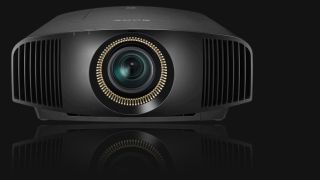
Specifications
Reasons to buy
Reasons to avoid
The Sony VPL-VW590ES is a step up from its much-loved predecessor the VW570, mostly thanks to the incredible X1 chip which has been based on Sony’s Bravia TV technology.
✅ You want super high end image quality
✅ You have plenty of space or a sturdy bracket
✅ You've already got an audio solution
❌ You need built in speakers
❌ You won't make the most of its image quality
Design: The VPL-VW590ES is large and heavy, but so are most 4K native projectors. However, this thing weighs in at 14kg, which can be a concern if you plan on mounting it above your head. However, its smooth corners and longer rectangular shape is a staple among high end 4K projectors, and it keeps things manageable as long as you have a sturdy bracket above.
Features: That Bravia tech is the biggest feature here, optimised for super high-end picture and upscaling. Aside from that, though, you're also getting dynamic HDR for frame by frame rendering. A slight quibble is the lack of connectivity beyond HDMI and USB, but if you’re shelling out this much for a projector you’re likely to have an amp ready to go for this already, so not having inbuilt speakers may not be such a problem.
Performance: The X1 is an incredibly fast processor which is constantly working to give you incredible picture quality – analysing frame by frame to ensure everything looks sharp and smooth. Bright enough to be great quality picture even with significant levels of ambient light, and with astonishing depth of colour and contrast.
It’s great for gaming with no notable input lag, and the expansive landscapes of open-world games look astonishing in a 4K image of over 100 inches – but so do the bright colours of a platformer. It gives incredible detail even in the darkest shadow, a feat few projectors manage.
Verdict: Yes, it’s pricy, but the Sony VPL-VW590ES is a cutting-edge projector which truly brings the cinema home and worth the money if you have it.
Read more: Sony VPL-VW590ES projector review
The best 4K projector for gaming





Specifications
Reasons to buy
Reasons to avoid
If you're after a low latency 4K projector for gaming, the BenQ X3000i is a must-see. While its super smooth gameplay features are impressive, this is a device that can handle movies and TV just as well.
✅ You want low latency gaming
✅ You have plenty of space
✅ You want a few dedicated streaming apps
❌ You need to mount your projector
❌ You're working with a smaller space
❌ You don't need low latencies for gaming
Design: The X3000i is a larger 4K projector, with a tall form factor and wide base. The height of the unit makes it bulky, but really this is quite a minor complaint and there’s a lot of technology to cram in. Still, this isn't one for mounting or tucking away into a hidden corner. It's a good thing that the aesthetic itself is so clean, then, with a crisp white plastic chassis and dark black lens panel outlined with a fun orange strip.
Features: BenQ has offered a first with the X3000i's specs:: 4K gameplay with 16ms input lag at 60Hz (with the ability to go as low as 4ms input lag with some sacrifices to other image settings). They’ve also thought in depth about not just the needs of gamers all round but different types of gamers. The X3000i is one of the best 4K projectors but is aimed at role-playing gamers – players who want to be truly immersed in the amazing worlds that triple-A titles are focussing on so much now. The key to this is BenQ’s CinematicColour system which offers incredible colour reproduction. The depth of colour is astonishing, with incredibly rich reds, blues and greens on the landscapes of next-gen games. There’s built-in streaming through an integrated Android dongle, but as usual there are key apps missing.
Performance: The unit offers something for everyone – the low input lag means that playing first-person shooters is a smooth experience even when running through a map or moving fast to take out a horde of foes. And bright party games like Fall Guys or Mario Kart look astonishing, even in ambient light which can so often wash the colour out of other projectors. While it’s designed for gamers, watching films or TV shows is also a joy, whether a bright Pixar film or a gritty drama – the detail in the dark colours works well for picking out an enemy lurking in the shadows in a shooter or keeping track of a fight scene in a DC movie.
Verdict: BenQ has raised the bar for projectors with this range and the X3000i has produced some of the best 4K projector gaming images we have ever seen.
Read more: BenQ X3000i review
4K projectors: FAQ
Is it worth buying a 4K projector?
If you're looking for a high-end home cinema experience, a 4K projector is almost definitely going to be a worthwhile investment. You're getting a higher quality resolution to match the boosted picture quality of today's biggest streaming services. However, if you're just after a more casual device for the odd movie night then the higher cost might not make sense. In this situation, a cheaper 1080p model might be easier to reconcile with your wallet.
How bright should a 4K projector be?
The majority of 4K projectors aiming to offer a fairly luxurious experience will be offering 3,000 lumens of brightness. This is the sweet spot for a 120-inch display with a little daylight peeking through. If you're only going to be watching in the dead of night, or on a smaller screen, then you can get away with 2,000 lumens. However, high-light situations will call for 4,000 lumens - and you'll even find some 4K projectors offering 5,000 or 6,000 lumens.
Are 4K projectors really 4K?
A lot of projectors labelled as 4K are actually using a technology called pixel shifting, rather than offering 'native' 4K processing straight from the device. The resulting image outputs at 4K resolution but, crucially, costs far less than a full UHD chip. Native 4K projectors are still incredibly expensive, so if you're spending under $3,000 on a device it's likely using pixel shifting.
Are 4K projectors as good as 4K TV?
There are some 4K projectors that are as good, if not better, than 4K TVs - but you're paying a lot more for them. The picture quality from some of the best models on the market is pretty similar to that of a traditional television these days, even if prices soar once you're in this category. However, projectors have their own benefits that TVs can't match - their relative portability (especially if you pick up an outdoor model), adjustability, and increased maximum screen size make them a compelling home cinema option.
4K projectors glossary
Why you can trust GamesRadar+
Blooming
Blooming occurs when light is concentrated in one area only, creating a distorted effect on the image as a whole.
Contrast Ratio
The contrast ratio dictates how far apart your lighter and darker colors are - and therefore how strong your contrast will be.
Ghosting
When a projector and its source are not synced correctly, ghosting can occur. It displays as a faint repeated image on the screen.
HDR
HDR (High Dynamic Range) is a picture process that allows very dark and very light scenes to be shown in more detail. There are several different versions of HDR, from HDR10 to HLG.
Input Lag
A 4K projector may have a higher input lag than a 1080p model. This is the amount of time it takes for a picture to be cast upon your screen after being received from the source (your console or streaming stick).
Keystone
A projected image can lose its square shape if the projector is not properly set up. Keystoning is the process of correcting this.
Lumen
A lumen is a measurement of brightness in projectors, describing the power output.
Native Resolution
The native resolution is an important factor to consider when buying a 4K projector. It's the hardware's maximum resolution, before any computer work is applied. Many excellent 4K devices actually have a native resolution of 1080p and then upscale their picture to full 4K. A projector with a native UHD resolution is going to perform better, but is still vastly more expensive.
Pixel Shifting
Pixel shifting is the process that many 4K projectors use to upscale a 1080p picture. The device throws two 1080p images with one moved slightly off from the other - the result is a more detailed image at 4K resolution.
UHD
UHD stands for Ultra High Definition, a picture quality that includes 4K and 8K images.
Upscaling
Upscaling is the process in which a processor is able to convert a 1080p picture into 4K.
Remember to peruse the best projector screen and best outdoor projector screen markets to ensure you have the right gear for your projected images.
And also remember that it's always worth trying to get hold of a new console for your new 4K projector so you'll need to know how to find buy a PS5 and how to buy Xbox Series X. And if you do prefer your screens TV-shaped then check out our guides to the best TV for PS5 and Xbox Series X, best 120Hz 4K TV, and best OLED TV too.
Sign up to the GamesRadar+ Newsletter
Weekly digests, tales from the communities you love, and more
Will is a freelance writer for a number of publications including GamesRadar, where he covers hardware reviews - with projectors being a particular point of interest. Along with his work for GamesRadar, his words can be found in the Orlando Sentinel. He's also a professional wrestler, enjoys running, and playing guitar.
Most Popular


